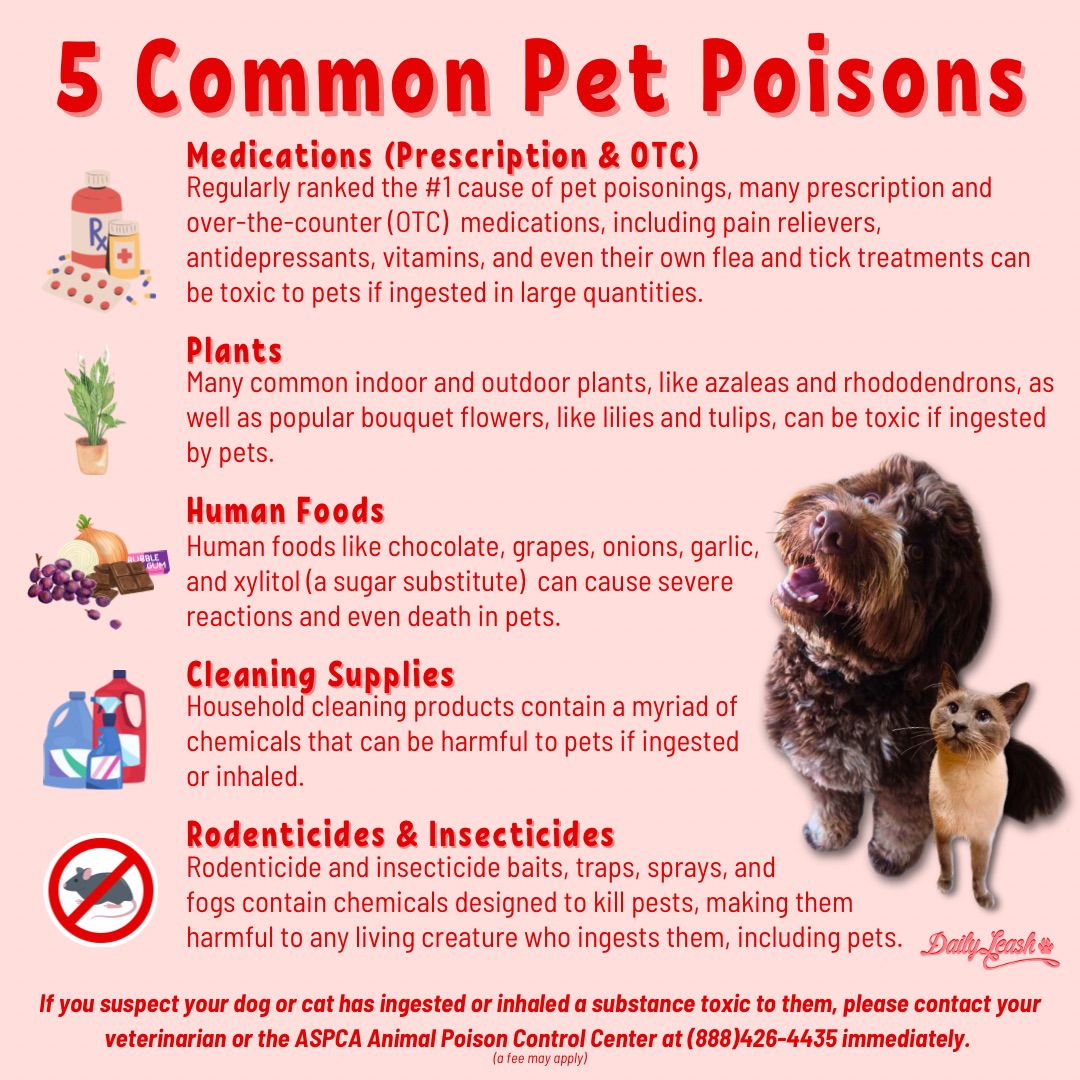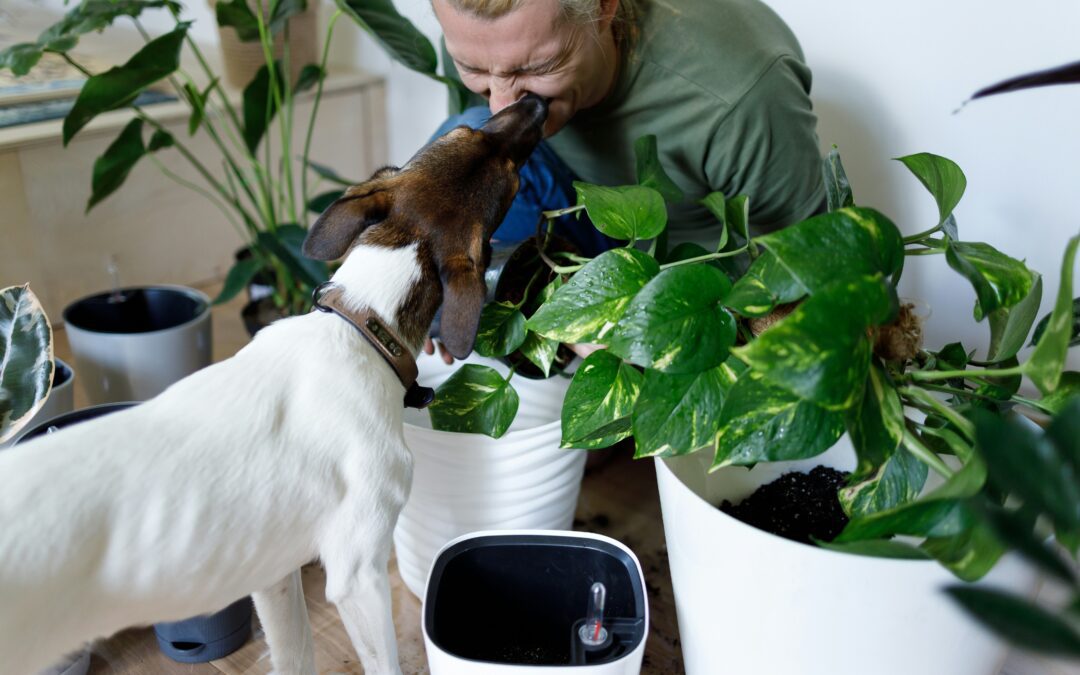Hundreds of thousands of pet poisonings are reported every year, many caused by common household items that we humans consider harmless. Pets, especially cats and dogs, are curious creatures who can easily get into things around the house. Due to their vastly different metabolic systems, many items considered safe for people can present a real danger to our pets. In commemoration of National Pet Poison Prevention Month, a time dedicated to raising awareness about the dangers of poisonous substances and how to keep our furry loved ones safe, we’ve compiled a list of five common pet poisons and how to prevent accidental exposure.
1.Medications (Prescription and Over the Counter)
Regularly ranked as the most prevalent cause of pet poisonings, prescription and over-the-counter (OTC) medications pose a significant threat to pets. Medications like pain relievers, antidepressants, vitamins, and even your dog or cat’s own flea and tick treatments can be toxic to pets if ingested in large quantities. Dogs, in particular, are notorious for finding and chewing on pill bottles. It is important to remember that “child-proof” does not mean “pet-proof” and be especially aware of any medications — like pain meds, joint rubs, marijuana and CBD products, or sleeping pills that might be left in a backpack, purse, car, or by your bedside. Keep all medications — prescription and OTC, human and veterinary — securely stored in cabinets or drawers that are out of reach of curious pets. Additionally, never administer any medication to your pet without consulting with your veterinarian first.
2. Plants
Plants add beauty and warmth to our homes, but many common indoor and outdoor plants, as well as popular bouquet flowers, can be toxic if ingested by our pets — including lilies, tulips, and azaleas, just to name a few. Before bringing any new plants into your home or any outside space accessible to your cat or dog, be sure to research their toxicity to your pets. Click here to see the ASPCA’s list of toxic and non-toxic plants. If you already have plants in your home, ensure they are placed in areas inaccessible to your furry companions, or opt for pet-safe alternatives.
3. Human Foods
While certain human foods are safe for pets in moderation, many can be harmful or even fatal. Foods like chocolate, grapes, onions, garlic, and xylitol (a sugar substitute commonly found in gum, candy, and even some peanut butter and toothpaste) can cause severe reactions in pets. It is crucial to educate yourself on which foods are safe and which are not and to read all labels before sharing anything with your dog or cat. The American Kennel Club (AKC) has a thorough list of popular foods you should and shouldn’t share with your pets to get you started. Store all human food securely and be vigilant about leaving anything out within reach of hungry pets.

4. Cleaning Supplies
Household cleaning products contain a myriad of chemicals that can be harmful to pets if ingested or inhaled. Bleach, ammonia, and toilet bowl cleaners are just a few examples of common household cleaners that can be toxic to pets. Despite a less-than-ideal taste, many of these products have a smell or texture that may be enticing to your cat or dog, so it is essential to store them in pet-proof containers or behind latched cabinet doors. When using cleaning products, ensure proper ventilation and keep pets away from treated areas until surfaces are completely dry. You may also consider using pet-safe cleaning products or natural alternatives to reduce the risk of accidental poisoning.
5. Rodenticides and Insecticides
Rodenticide and insecticide baits, traps, sprays, and fogs contain chemicals designed to kill pests, making them harmful to any living creature who ingests them, including your pets. Many of these highly toxic chemicals can cause severe illness or even death and often signs and symptoms can take several days to notice. If you must use these products, do so with extreme caution. Place baits and traps in areas inaccessible to pets, and consider using pet-safe alternatives whenever possible.
Pet poison symptoms can vary substantially in severity and onset depending on your dog or cat’s body, health, and age and how much of a particular substance they ingest or inhale. These symptoms may include, but are not limited to, gastrointestinal and neurological issues, cardiac and respiratory distress, coma, or even death. If you suspect your dog or cat has ingested or inhaled a substance toxic to them, please contact your veterinarian or the ASPCA Animal Poison Control Center at (888)426-4435 immediately.
Protecting our furry family members from common poisons requires diligence and awareness. By taking simple precautions like storing medications and household chemicals securely, researching the toxicity of plants and foods, and using pet-safe alternatives whenever possible, we can help ensure the safety and well-being of our furry companions for years to come.
Related Articles:
Paws and Pine: A Guide to Pet Proofing Your Christmas Tree
Cold Weather Tips: Preparing Your Pets for Winter
Spook-tacular Pet Safety: Tips for a Scare-Free Halloween

